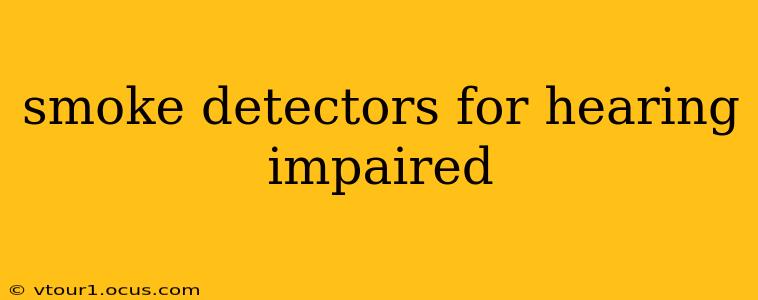For individuals with hearing impairments, ensuring home safety requires proactive measures beyond standard smoke detectors. Traditional smoke detectors rely solely on audible alarms, leaving a vulnerable population at risk. Fortunately, advancements in technology offer a range of solutions designed specifically to alert hearing-impaired individuals to potential fire hazards. This comprehensive guide explores the best options available, addressing common concerns and helping you choose the right smoke detector for your needs.
What are the Different Types of Smoke Detectors for the Hearing Impaired?
Several types of smoke detectors cater to the needs of the hearing impaired, each offering unique advantages:
-
Visual Smoke Alarms: These detectors incorporate bright flashing strobe lights that activate upon detecting smoke. The intensity and frequency of the flashing lights are designed to be highly visible, even in low-light conditions. Many models also include a vibrating pad that can be placed under a pillow or mattress for additional tactile alerts.
-
Combination Smoke and Carbon Monoxide Detectors: These combine smoke detection with carbon monoxide detection, providing comprehensive home safety coverage. They typically offer both visual and audible alarms, making them suitable for households with both hearing-impaired and hearing individuals. These dual-sensor alarms provide a much wider safety net.
-
Wireless Interconnected Smoke Alarms: These systems connect multiple detectors throughout the home. When one detector senses smoke, all others in the network sound their alarms (audible and/or visual) simultaneously, increasing the chances of alerting everyone in the house. This is particularly beneficial for larger homes or those with multiple levels.
-
Smoke Detectors with Specialized Alert Systems: Some manufacturers produce smoke detectors with additional features like bed shakers or voice alerts that speak the message "Fire! Fire!" These options add an extra layer of security for those who might not respond to visual cues alone.
How Do I Choose the Best Smoke Detector for My Needs?
Choosing the right smoke detector depends on several factors:
-
Type and Severity of Hearing Loss: Consider the individual's specific hearing loss. For those with profound hearing loss, a combination of visual and tactile alerts is essential.
-
Home Size and Layout: For larger homes, a wireless interconnected system offers superior coverage.
-
Budget: Prices vary depending on features and technology. Balance your budget with the level of safety needed.
-
Ease of Installation and Maintenance: Choose a system that is easy to install and maintain, ensuring it functions correctly at all times. Regular battery checks and testing are crucial for any smoke detector.
What are the Most Important Features to Look for in a Smoke Detector for the Hearing Impaired?
Several key features enhance the effectiveness of smoke detectors for the hearing impaired:
-
Bright, High-Intensity Strobe Light: The strobe light should be powerful enough to penetrate even bright rooms or nighttime conditions.
-
Tactile Alarm (Vibrating Pad): This is crucial for individuals who may not see the strobe light due to sleep or other factors.
-
Easy-to-Understand Instructions: Clear, concise instructions are essential for proper installation and use.
-
Reliable Power Source: Consider models with backup batteries to ensure continued operation during power outages.
-
Maintenance Indicators: Look for alarms with clear indicators to signal when battery replacement or testing is needed.
What is the Best Location to Install Smoke Detectors for the Hearing Impaired?
Strategically placing smoke detectors maximizes their effectiveness. The ideal placement generally involves:
-
Inside each bedroom: This ensures timely alerts to those sleeping.
-
Outside each sleeping area: This provides an early warning in case a fire originates outside the bedroom.
-
On every level of the home: Multiple detectors provide comprehensive coverage.
-
In hallways: Hallways are common routes of escape, and a detector here can offer valuable warning.
Remember, proper placement is critical. Follow the manufacturer's instructions for optimal performance.
How Often Should I Test My Smoke Detectors?
Regular testing is vital to ensure your smoke detectors function correctly. Test your detectors at least monthly, and replace batteries as needed. Check the manufacturer's instructions for specific guidance on maintenance and testing procedures.
Where Can I Buy Smoke Detectors for the Hearing Impaired?
You can typically find smoke detectors designed for the hearing impaired at most home improvement stores, online retailers, and specialty medical supply stores. Look for brands known for their reliable safety products.
This information is for guidance only and does not constitute professional advice. Always refer to the manufacturer's instructions for your specific smoke detector model. Prioritizing home safety for all family members is paramount, and choosing appropriate smoke detectors is a significant step towards achieving that goal.
